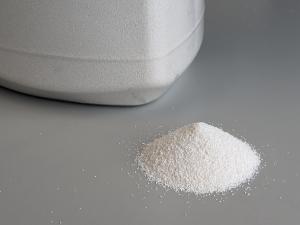Puraffinity and U.S. Army Corps of Engineers Partner to Advance PFAS Remediation Technologies
US Army and Puraffinity will conduct a series of laboratory and field trials.
LONDON, UNITED KINGDOM, July 20, 2025 /EINPresswire.com/ -- Puraffinity, a leading innovator of advanced adsorbents for the removal of per- and polyfluorinated alkyl substances (PFAS), announces a Cooperative Research and Development Agreement (CRADA) with the U.S. Army Engineer Research and Development Center (ERDC). The goal of the collaboration is to conduct research and field demonstrations involving Puraffinity’s Puratech G400, an adsorbent material developed for the treatment of PFAS-contaminated waters.Under this agreement, ERDC and Puraffinity will conduct a series of laboratory and field trials. These trials will compare the performance of Puratech G400 with other PFAS treatment technologies such as Granular Activated Carbon (GAC) and Ion Exchange Resins (IEX). The primary objective is to explore Puratech G400’s potential in improving treatment outcomes and reducing operating expenses (OPEX) and capital expenditure (CAPEX) in PFAS remediation. The research will target contamination sources from legacy facilities, including aqueous film-forming foams (AFFF).
The key research objectives include:
• Conducting laboratory and pilot-scale testing using real-world PFAS-contaminated water samples from both Department of Defense (DoD) and non-DoD sites.
• Developing performance data to inform potential future applications on DoD installations and other settings.
• Evaluating the use of Puratech G400 as a complementary or polishing step to existing destruction technologies.
“This collaboration with the ERDC marks a significant milestone in our mission to deliver innovative, scalable, and sustainable PFAS treatment technologies,” said Vincent Caillaud, CEO of Puraffinity. “We are proud to work alongside one of the world’s foremost research institutions to generate robust performance data and contribute meaningfully to the field of PFAS remediation.”
The research initiative forms part of a broader strategic effort, reflecting Puraffinity’s commitment to scientific rigor and collaborative innovation with government, industry, and academic stakeholders addressing the global PFAS challenge.
Ade Alao
Puraffinity
ade@puraffinity.com
Legal Disclaimer:
EIN Presswire provides this news content "as is" without warranty of any kind. We do not accept any responsibility or liability for the accuracy, content, images, videos, licenses, completeness, legality, or reliability of the information contained in this article. If you have any complaints or copyright issues related to this article, kindly contact the author above.
leagend BMS100 Sets New Standard for Real-Time Battery Monitoring in High-Demand Environments
AI CERTs® Launches AI+ Security Level 3™ to Equip Cyber Pros for Intelligent Threat Defense
Giant Leap Day July 20
Kalendarium
Więcej ważnych informacji
 Jedynka Newserii
Jedynka Newserii

 Jedynka Newserii
Jedynka Newserii

Prawo

KE proponuje nowy Fundusz Konkurencyjności. Ma pobudzić inwestycje w strategiczne dla Europy technologie
W środę 16 lipca Komisja Europejska przedstawiła projekt budżetu na lata 2028–2034. Jedna z propozycji zakłada utworzenie Europejskiego Funduszu Konkurencyjności o wartości ponad 400 mld euro, który ma pobudzić inwestycje w technologie strategiczne dla jednolitego rynku. Wśród wspieranych obszarów znalazła się obronność i przestrzeń kosmiczna. Na ten cel ma trafić ponad 130 mld euro, pięciokrotnie więcej niż do tej pory.
Firma
Były prezes PGE: OZE potrzebuje wsparcia magazynów energii. To temat traktowany po macoszemu

Choć udział odnawialnych źródeł energii w miksie energetycznym Polski jest stosunkowo wysoki i rośnie, to ten przyrost jest chaotyczny i nierównomiernie rozłożony miedzy technologiami – wskazuje Forum Energii. Dodatkowo OZE potrzebują wsparcia magazynów energii, a zdaniem Wojciecha Dąbrowskiego, prezesa Fundacji SET, ten temat jest traktowany po macoszemu. Brak magazynów powoduje, że produkcja energii z OZE jest tymczasowo wyłączana, co oznacza marnowanie potencjału tych źródeł.
Infrastruktura
Wzrost wynagrodzeń ekip budowlanych najmocniej wpływa na koszty budowy domu. Zainteresowanie inwestorów mimo to nieznacznie wzrasta

Budowa metra kwadratowego domu w Polsce kosztuje od 5,55 do 6 tys. zł w zależności od województwa – wynika z najnowszych analiz firmy Sekocenbud. Najdrożej jest w Warszawie, gdzie cena za metr kwadratowy domu przekroczyła już 6,2 tys. zł. Na przyrosty kosztów budowy domu wpływają zarówno drożejące materiały budowlane, jak i wyższe wynagrodzenia pracowników. Inwestorzy nie rezygnują jednak z budowy domów jednorodzinnych, co ma związek m.in. z wciąż wysokimi cenami mieszkań czy też obniżką stóp procentowych.
Partner serwisu
Szkolenia

Akademia Newserii
Akademia Newserii to projekt, w ramach którego najlepsi polscy dziennikarze biznesowi, giełdowi oraz lifestylowi, a także szkoleniowcy z wieloletnim doświadczeniem dzielą się swoją wiedzą nt. pracy z mediami.









.gif)

 |
| |
| |
|